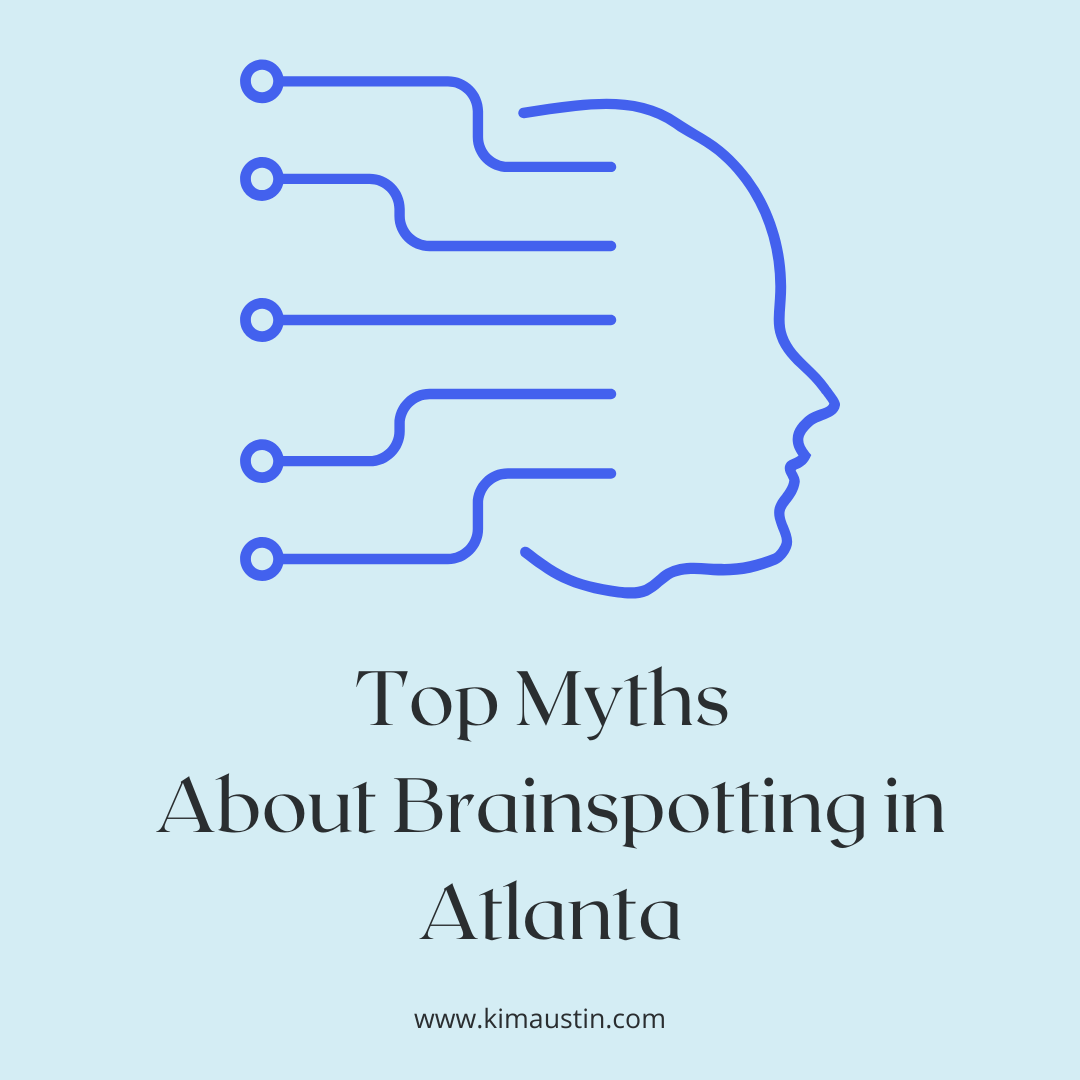Top Myths About Brainspotting Atlanta
Brainspotting Atlanta? What is that?
You have been searching for alternative types of therapy in Atlanta but, there are a lot of Atlanta therapists and many types of therapy. And all the names like EMDR, Brainspotting, IFS, Somatic Experiencing, Yoga for Trauma, EFT...blah blah blah…have you confused.
Yet you know you need to try some alternative approach. You feel like you hit a wall with traditional therapy and you are not sure what will help you “breakthrough.” You’ve heard some things about Brainspotting but, to be honest, it sounds weird. Let’s talk about the top myths about Brainspotting; what is accurate and what is not.
Brainspotting is only for PTSD and “big” traumas.
Not true. You may be surprised to learn that Brainspotting was discovered while the founder, David Grand, PhD, was working with an athlete (an ice skater) on a performance block she had. Brainspotting can help athletes, performers, and executives improve their performance and enhance creativity. In the case of the ice skater, earlier trauma happen to be related to her sports block but trauma is not always the source of a “block”. Many people come to see me for Brainspotting in Atlanta because it is known to be a powerful treatment for PTSD and trauma recovery. Other clients come to see me because they haven’t been able to break an emotional pattern, a habit, or to be less reactive in relationships. They often have an awareness of the pattern and have tried to break it but the pattern persists. Brainspotting often helps people lower reactivity and shift emotional patterns, whether or not the source of the issue is trauma-based. All different types of life experiences can influence how we show up to and interact with the world.
Brainspotting won’t work unless you have a specific memory of precise issue.
I hear this one from many clients, especially those that may have tried the traditional EMDR protocol which often asks for a specific traumatic or painful memory (although you don’t really need a concrete memory for EMDR either). If you witnessed a traumatic event or experienced a traumatic loss, you may have a specific painful memory. In this case, you and your Brainspotting therapist may decide to begin with this intrusive memory. Some come to me wanting to utilize Brainspotting for childhood abuse or neglect. They may have a several memories or something they aren’t sure is a “real memory”. Other clients don’t have any specific memories or may not able to articulate their “issue”. They may feel something isn’t “right” or something is preventing them from feeling calmer and engaging more in their lives. This is actually not uncommon. Words often fail and our conscious minds cannot grasp what we may be held more deeply. As Brainspotting founder, David Grand, PhD, states, “you do not have to know what it is to know that it is.” Brainspotting can still work for you. As, an Atlanta Brainspotting therapist, I will assist you and be with you as your brain processes whatever it needs to process.
Brainspotting is magic.
Brainspotting certainly seems like magic given how profoundly and rapidly it often works. I have Atlanta Brainpsptting clients come out of a single Brainspotting session amazed at their process. The capacity of the human brain and body is remarkable. It can seem like magic when we cut ourselves and the wound heals with little to intervention from us. The truth us our brains can also help us recover from emotional and psychological injuries. Brainspotting simply taps into the brain’s inherent healing mechanism and when it does, it can feel miraculous. Brainspotting is also faster than traditional therapy. People can find relief in 1 to 3 sessions. Many people report significant positive outcomes after weeks or months of Brainspotting. For others, it may take years. Everyone is unique and so are their experiences and paths to healing. Brainspotting, has transformed my practice as an Atlanta therapist and my understanding of healing. The insights, clarity, and recovery I have witnessed have been remarkable.
Clients need to do Brainspotting “right” or it won't work.
Yes, performance anxiety is a thing even in Atlanta Brainspotting therapy. And when therapy is an alternative therapy or more cutting edge like Brainspotting, people worry even more about “doing it right.” I hear this almost every time a new client begins Brainspotting with me. And it’s okay, it is normal to have some anxiety when you are trying something new. I also think that a lot of people struggle with performance anxiety with Brainspotting specifically because it invites people to check in more with their bodies, emotions, and felt sense. Something we are not always taught or encouraged to tune into, particularly in the west. Brainspotting also asks the client to practice focused mindfulness and encourages being open to whatever arises in our experience. There truly is no right or wrong. In Brainspotting, you don’t have to do, just be. And this is a bit different than what most people are used to. And that’s okay. It really is. As an Atlanta Brainspotting therapist, I am with you however strange or awkward you may feel in trying something new and whatever comes up. And it is my honor. Really. It’s ok. Your brain and nervous system know how to help you.
Nothing Replaces Ones Own Experience. Reach out to see if Brainspotting could be helpful for you.
I hope this helps you better understand Brainspotting in Atlanta. If you would like to explore Atlanta Brainspotting therapy with me, click here to schedule a free consultation or feel free to call me at (207) 295-7427 . If you would like to learn more about me and my practice, click here.

